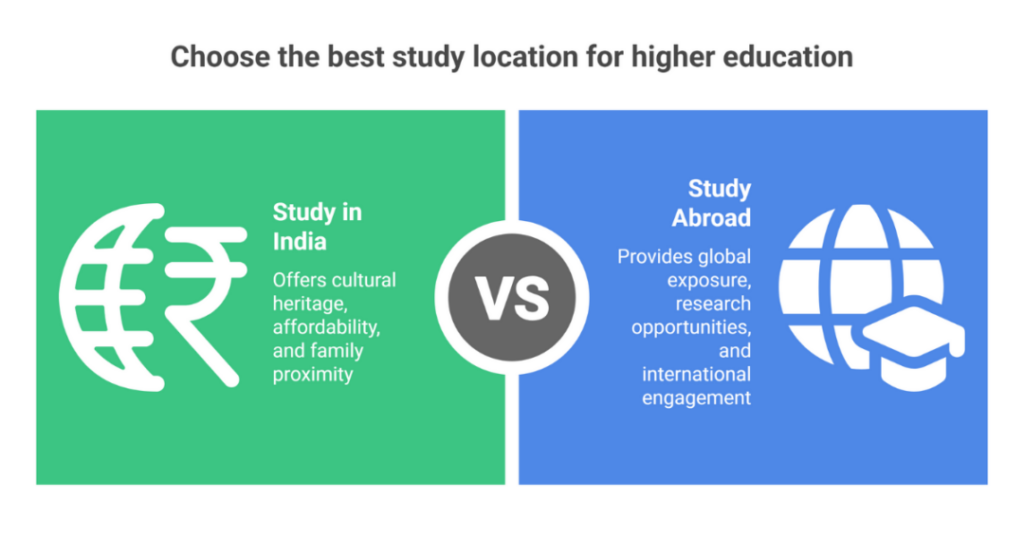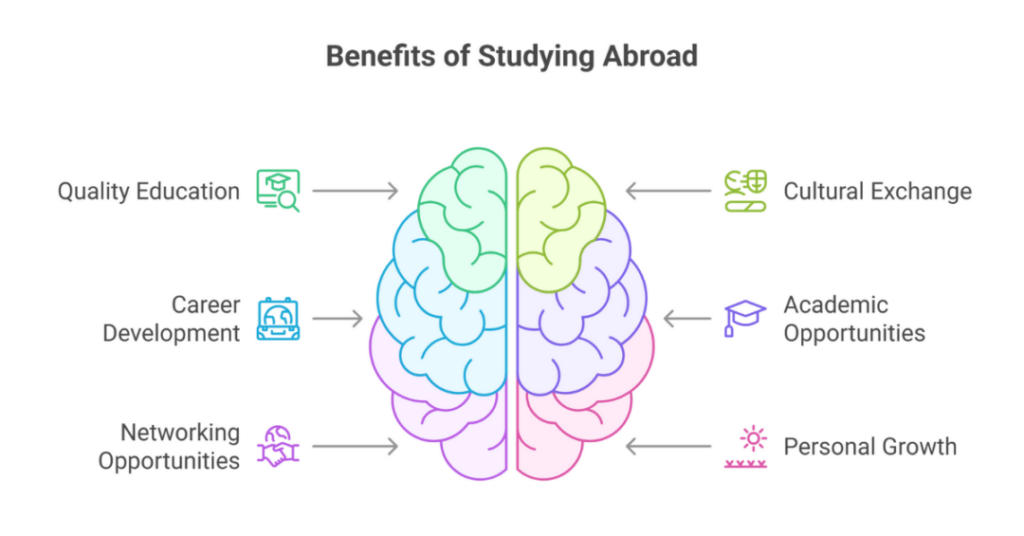21 August 2025
7 minutes read
Benefits of Studying in India vs Abroad and Factors to Consider While Making a Decision (Study Abroad vs India for Indian Students)

Key Takeaways
- Benefits of studying in India vs abroad include affordable tuition in India and global exposure abroad, helping students make an informed choice.
- Benefits of studying in India vs abroad highlight cultural heritage at home and international education overseas, both offering unique advantages.
- Benefits of studying in India vs abroad show how students balance cost of education, research opportunities, and career goals before making a decision.
The decision to study abroad or in India is one of those life-altering choices every aspiring Indian student must face when thinking of higher education. Studying in India provides a rich cultural heritage, diverse courses of study, and fewer expenses, meanwhile studying abroad provides global exposure, strong research opportunities, and global thinking.
When studying abroad, students access international engagement and education, establish a global community of contacts, and can expand their horizons. However, pursuing education in India poses restrictions on certain opportunities, but it does make education affordable, offers great pedagogical methods, and is close to family.
Prospective students usually face the dilemma of a decision – to study in India or go abroad. The positive elements of both of these decisions allows students to experience the benefits of study, yet each offers distinct benefits, cons of going abroad vs studying in India, and various considerations before making a decision that aligns.
Choosing to Study Abroad is Better for Quality Education: True or False?
Did you know that the University of Bologna in Italy is also considered the oldest university in the world (originated in 1088)? This fun fact demonstrates that there are affordances to studying abroad such as a long-standing tradition of higher education, but does that make abroad more of a better a choice than Indian universities?

When weighing your choices about studying abroad, an incoming student would want to think about some or all of these key points:
- Research Opportunities: The education system abroad tends to have more advanced labs, globally trusted educational facilities, and, importantly, opportunities for joint projects for cross-border research including the ability to access more fortunate research funding worldwide than so many universities in India.
- Connections to a Global Perspective: More advanced education systems means students will be exposed to new teaching methods and have global connecting to peers from diverse backgrounds.
- Cost of Education: While studying abroad may be pricey depending on where one studies as well as tuition fees and the costs associated with living, educational costs to study in India are cheap in comparison to abroad. Students are afforded university tuition fees, their extremely low per course costs of studying in India makes education attainable.
See table comparing key factors on the quality of education abroad relative to studying in India:
| Factor | What Studying Abroad Offers | What Studying in India Offers |
|---|---|---|
| Research Opportunities | Advanced labs, global exposure, joint projects | Limited research opportunities but some are growing |
| Teaching Methods | Modern, interactive, global education system | Traditional focus limited to theory but improving |
| Global Connections | Strong connecting to peers globally from various countries abroad | Concerning, limited connections focused to peers from India |
What are Some Pros and Cons of Studying Abroad?
Are you aware that many international students studying abroad are allowed to stay back for a couple of years after graduation? This makes studying abroad a worthwhile option, however, you need to think about both sides of studying.
A few pros:
- Global exposure so that international students can develop their intercultural skills.
- Scholarships and research options available abroad too.
- You can develop a global network and enhance your career options.
A few cons:
- The costs and high living expenses associated with studying abroad.
- Students will often have a visa and education loan burden on their backs.
- Some of the cultural adjustment and how difficult it can be to stay away from family.
Pros and cons of studying abroad
| Pros | Cons |
| Global exposure, new language | Expenses of studying and burden of student loans |
| Access to international education | Visa and GPA / tests that are required (GRE/ IELTS/ TOEFL/ GMAT/ SAT/ ACT) |
| Build a global network | Emotional challenge of staying away from home |
Advantages of Study Abroad vs Study in India for Indian Students
Did you know that India ranks second in terms of student enrollment in higher education in the entire world? While education in India is progressing, students seeking global education will always have various intrinsic advantages that students in India will inherently not possess.
Some inherent advantages of studying abroad:
- Experience/ Exposure to new teaching pedagogies and method of global education system.
- This is an opportunity to also learn a new language along with involvement of other cultural environments.
- You will have a better looking resume when applying internationally with your accomplishments, backed by your transcripts, personal statement, statement of purpose, GPA, letter of recommendation and resume.
Some inherent advantages of studying in India:
- Cost, studying in India is very cheap when compared to many other countries around the world.
- Experience cultural heritage and also being closer to family.
- The sheer number and diversity of courses that India has to offer at many Indian universities.

Table: Advantages of Abroad vs India
| Aspect | Study Abroad Offers | Studying in India Provides |
| Cost of Education | Higher tuition and living expenses | Many affordable education loan options |
| Cultural Exposure | Diverse perspectives, experience new culture | Rich cultural heritage of India |
| Career Prospects | Global exposure and global network | Growing opportunities in India |
Benefits of Studying in India vs Abroad
Did you know that numerous universities in India are now being ranked globally and attracting thousands of international students? Studying in India also provides tremendous aspects of cultural and educational awareness. Studying abroad will also offer unique experiences that broaden perspectives.
Benefits of Studying in India:
- Tuition fees are cheap, and education plays a reasonable role in costs relative to studying abroad.
- Students will be exposed to a wealth of culture and be supported by family and a stable educational foundation in India.
- Indian students have access to many courses in India and Indian universities, therefore education is accessible to many students in India.
- The limitations of studying in India is the students need to develop a network globally, however staying in India gives them a chance to develop a network in India.

Benefits of Studying Abroad:
- Studying abroad provides international education, broader perspectives, and a network of contacts globally.
- Undergraduate study abroad access to advanced research and scholarship in many countries.
- Overseas education provides opportunities for personal development, adaptation to internationalism and experience in varied cultural and professional settings as well as work for students abroad.
Table : Studying in India versus Studying in Abroad Benefits.
| Benefits | Studying Abroad Could Offer | Studying in India Could Foster |
| Global Exposure | International education, variety of culture | Study in India offers exposure of cultural heritage |
| Research Opportunities | Advanced research facilities, collaboration on projects, funding for research | Research in India is growing underfunded |
| Cost of Study | High tuition rates, and higher cost of living | Lower tuition & lower cost of education |
| Global Network | Build contacts globally | Students build contacts within India |
| Academic Credential | Internationally recognised qualifications, recognised by IELTS, GRE, GMAT, TOEFL, ACT, SAT | Transcripts would be recognised nationally, in India |
Do the Benefits of Studying Abroad Overshadow its Disadvantages?
Did you know that over 750,000 students from India study abroad each year? This will only increase with time and considerable expense, Does this outweigh the drawbacks?
- Internationally, you gain global exposure, you can broaden your mindset, and you get international education.
- You acquire access to a host of research opportunities, scholarships and global education systems as an international student.
- Studying abroad is never easy due to issues like high tuition fees, complicated visa processes and high cost of living because compared to India is expensive.
Table: Benefits Compared to Disadvantages of Studying Abroad
| Benefits | Disadvantages |
| Access to global network and new ideas | Cost of education and costly living |
| International education recognition | Cultural adjustments |
| Scholarship and research opportunities | Visa issues, GPA eligibility |
Factors to Consider: Studying in India and Abroad
Did you know that deciding to study in India or abroad is guided not only by academics but personal goals? Students’ decisions are made based on career objectives, financial costs, and culture.
Here are some important factors to consider:
- Costs of Studying: Tuition costs, costs of educational loan, and living expenses.
- Career Aspirations: If a global network or opportunities within India are better aligned with the student career aspirations.
- Cultural Adjustment: Students who are studying abroad will have to adjust to a new culture, while studying in India, the students will be more comfortable within their own culture.
Table: Key Factors to Consider
| Factor | Abroad to Study | Consider Studying in India |
| Cost of Education | High, includes tuition and visa costs | Lower, manageable with education loan |
| Cultural Experience | Exposure to new, diverse cultural | Rich cultural heritage, staying in India |
| Career Prospects | Global perspective and global network | Local opportunities, growing job market |
Conclusion
Deciding whether to study in India or abroad depends on priorities of the student, costs of studying and aspirations for the future. Each option provides unique benefits, pros and cons studying, and opportunities. Therefore, students need to weigh all the factors regarding their field of study to make an informed decision.
For personalized guidance on your study abroad journey, get free counselling with Ambitio today.
FAQs
What are the benefits of studying in India vs abroad for Indian students?
The benefits of studying in India vs abroad include affordable tuition fees and cultural familiarity in India, while global exposure and advanced research are benefits of studying in India vs abroad for those who choose overseas education.
How do costs affect the benefits of studying in India vs abroad?
The benefits of studying in India vs abroad differ largely due to cost of education, with India offering lower tuition, while higher expenses also shape the benefits of studying in India vs abroad when students go abroad.
Do scholarships influence the benefits of studying in India vs abroad?
Yes, scholarships play a major role in the benefits of studying in India vs abroad, as financial aid abroad reduces tuition costs, enhancing the benefits of studying in India vs abroad for many students.
How does cultural exposure shape the benefits of studying in India vs abroad?
Cultural exposure adds to the benefits of studying in India vs abroad since staying in India fosters heritage learning, while diverse environments broaden the benefits of studying in India vs abroad.
What role does career growth play in the benefits of studying in India vs abroad?
Career opportunities are a key part of the benefits of studying in India vs abroad, as global networks abroad expand career prospects while Indian universities strengthen the benefits of studying in India vs abroad locally.
Are research opportunities part of the benefits of studying in India vs abroad?
Yes, research opportunities highlight the benefits of studying in India vs abroad, since overseas education provides advanced facilities while growing labs in India increase the benefits of studying in India vs abroad.
How do teaching methods impact the benefits of studying in India vs abroad?
Teaching styles shape the benefits of studying in India vs abroad, as global education abroad emphasizes interaction, while evolving methods in India also improve the benefits of studying in India vs abroad.

You can study at top universities worldwide!
Get expert tips and tricks to get into top universities with a free expert session.
Book Your Free 30-Minute Session Now! Book a call now




























